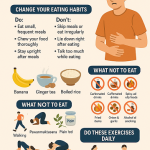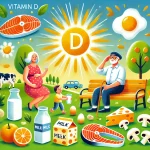Natural Ways to Boost Vitamin D Without Medication
Vitamin D is essential for our body as it strengthens bones, boosts immunity, and aids in calcium absorption. While our body produces vitamin D when exposed to sunlight, we can also fulfill its requirement through food. Let’s explore how different age groups and individuals with specific health conditions can naturally meet their vitamin D needs without medication.
For Children::
- Sunlight is the best source of vitamin D for children. Ensure they get 15-30 minutes of sun exposure daily.
- Include vitamin D-rich foods such as milk, egg yolk, and fatty fish (salmon, tuna, sardines) in their diet.
- Breastfeeding infants may require additional nutritional sources if the mother’s milk lacks sufficient vitamin D.
For Adult Men::
- A daily sun exposure of 15-30 minutes is essential for natural vitamin D synthesis.
- Consuming fatty fish, eggs, dairy products, mushrooms, and vitamin D-fortified cereals can help meet the requirement.
- Regular exercise enhances vitamin D absorption in the body.
For Adult Women::
- Women need sufficient vitamin D for bone health, so consuming dairy products (milk, yogurt, cheese), eggs, chia seeds, and almonds is beneficial.
- Sunlight exposure and regular exercise are crucial for maintaining adequate levels.
- Mushrooms and plant-based vitamin D sources should be included in their diet.
For Elderly Men and Women::
- Older adults are more prone to vitamin D deficiency, so regular sunlight exposure is crucial.
- Fatty fish (salmon, tuna), egg yolks, beef liver, and vitamin D-fortified cereals should be a part of their diet.
- Increased intake of dairy products can help reduce vitamin D deficiency.
For Pregnant Women::
- Vitamin D is essential for fetal bone and tooth development, so pregnant women should ensure adequate intake.
- Eating fish, eggs, dairy, nuts, and vitamin D-rich fruits can help maintain optimal levels.
- Sunlight exposure supports healthy bones and overall well-being during pregnancy.
For Diabetic Patients::
- Vitamin D plays a crucial role in improving insulin sensitivity, making it essential for diabetic individuals.
- Tuna, sardines, mushrooms, nuts, and low-carb dairy products can help maintain sufficient levels.
- Regular physical activity and sun exposure contribute to better diabetes management.
Conclusion
Meeting vitamin D needs without medication is possible through a balanced diet and a healthy lifestyle. Regular sun exposure, consuming nutrient-rich foods, and staying active help prevent deficiencies and support overall health. Embrace a healthy routine for a stronger and more resilient body!








